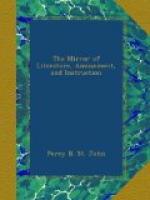—Why should the envious world
Throw all their scandalous malice upon me?
’Cause I am poor, deform’d, and ignorant;
And like a bow, buckled and bent together,
By some more strong in mischiefs than myself:
Must I for that be made a common sink
For all the filth and rubbish of men’s tongues,
To fall and run into? some call me witch;
And, being ignorant of myself, they go
About to teach me how to be one; urging
That my bad tongue (by their bad usage made so)
Forespeaks their cattle, doth bewitch their corn,
Themselves, their servants, and their babes at nurse;
This they enforce upon me; and in part
Make me to credit it. Witch of Edmonton.
The belief in witchcraft may be considered as forming a prominent and important feature in the history of the human mind. It is certainly one link of the degrading chain of superstitions which have long enslaved mankind, but which are now quivering to their fall. The desire for power to pry into hidden things, and more especially events to come, is inherent in the human race, and has always been considered as of no ordinary importance, and rendered the supposed possessors objects of reverence and fear. The belief in astrology, or the power to read in the stars the knowledge of futurity, from time immemorial has been considered as the most difficult of attainment, and important in its results. And by the aid of a little supernatural machinery, both magicians and astrologers exercised the most unlimited influence over the understandings of their adherents. An astrologer, only two or three centuries since, was a regular appendage to the establishments of princes and nobles. Sir Walter Scott has drawn an interesting portrait of one in Kenilworth; and the eagerness with which the Earl of Leicester listened to his doctrines and predictions, affords a good specimen of the manners of those times. The movements of the heavenly bodies, (imperfectly as they were then understood,) seemed to afford the most plausible vehicle for these “oracles of human destiny;” and even now, while we are tracing these lines, the red and glaring appearance of the planet Mars, shining so beautifully in the south-east, is considered by the many as a forerunner and sign of long wars and much bloodshed:
These dreams and terrors magical,
These miracles and witches,
Night walking sprites, et cetera,
Esteem them not two rushes.
Mankind are universally prone to the belief in omens, and the casual occurrence of certain contingent circumstances soon creates the easiest of theories. Should a bird of good omen, in ancient times, perch on the standard, or hover about an army, the omen was of good import, and favourable to conquest. Should a raven or crow accidentally fly over the field of action, the spirits of the combatants would be proportionably depressed. Should a planet be shining in its brilliancy at the birth of any one whose fortunes rose to pre-eminence,




